Newly ordained rabbi to focus on Muslim-Jewish relations
 Sarah Bassin started thinking she might want to be a rabbi while she was preparing for her Bat Mitzvah 16 years ago. Ordained last month by the Hebrew Union College-Jewish Institute of Religion in Los Angeles, she isn’t going to be a pulpit rabbi or an educator. Instead, she will start July 1 as the executive director of NewGrounds|A Muslim-Jewish Partnership for Change in Los Angeles.
Sarah Bassin started thinking she might want to be a rabbi while she was preparing for her Bat Mitzvah 16 years ago. Ordained last month by the Hebrew Union College-Jewish Institute of Religion in Los Angeles, she isn’t going to be a pulpit rabbi or an educator. Instead, she will start July 1 as the executive director of NewGrounds|A Muslim-Jewish Partnership for Change in Los Angeles.
Before her official duties begin she’ll be making a trip home to Kansas City to visit her family — her parents, Leah and Leonard Bassin and her brother’s family, Zack and Lindsey Bassin and their son, Jonah. While she’s here, she’ll participate in the Shabbat service on Friday night, June 17, at Congregation Kol Ami.
Rabbi Bassin is one of at least 15 people who were educated at The Temple, Congregation B’nai Jehudah, to become a rabbi. She became a Bat Mitzvah and was confirmed there, and also served as a volunteer B’nai Mitzvah tutor, which started immediately following her own Bat Mitzvah.
During that time she formed a close relationship with Cantor Paul Silbersher, who was the cantor at B’nai Jehudah when she was a young teen and who just retired as spiritual leader of Congregation Kol Ami. The Bassin family joined Kol Ami when it was formed in 2003.
“I actually continued a relationship with Cantor Silbersher throughout college and beyond,” said Rabbi Bassin. “When I started rabbinic school he was very supportive of my journey.”
She chose to attend Lafayette College in Easton, Pa. It has a small population, she estimates about 10 percent of the student body, of Jewish students. In 2004 she graduated with honors and summa cum laude with a Bachelor of Arts degree in religious studies and history.
“At my Bat Mitzvah I started throwing around the idea of becoming a rabbi. Throughout my high school experience in BBYO and my Hillel experience in college it just became more and more affirmed for me that that’s what I wanted to do,” she said.
“At the same time I become more certain that I didn’t want to go into congregational work. I knew I wanted to be a rabbi, but that wasn’t the incarnation of rabbi that I wanted to be,” she said.
Following graduation and before entering rabbinic school, she spent two years working at Princeton University’s Hillel. But it was a summer college internship with the American Jewish Committee in Chicago in 2003 that inspired her “to start pursuing the track of interfaith relations.”
Her interest in the field was reaffirmed during her first year of rabbinic studies in Jerusalem. There she worked with programs where she encountered Palestinians and learned more about Muslims and Islam.
“Once I started down that track I became much more passionate about pursuing Jewish-Muslim relations and focusing less on Jewish-Christian relations. That’s because it seemed to be a stronger and more pressing need to bridge the gap between Jews and Muslims.” Rabbi Bassin said.
She’ll be the first executive directly of the newly independent NewGrounds|A Muslim-Jewish Partnership for Change. It was used to be a partnership between the Progressive Jewish Alliance and Muslim Public Affairs Council. In fact the website, http://newgroundproject.weebly.com/, still describes the organization that way. Updating the website will be one of Rabbi Bassin’s first tasks as its director.
“The project is geared specifically toward young professionals of both communities and builds cohorts of Muslims and Jews who do intensive dialogue and relationship building with one another,” the young rabbi explains.
Rabbi Bassin said NewGrounds is becoming independent of its parent organizations because it’s been “a very successful project and has enough energy to go independent. So a number of people invested on both sides, both Muslim and Jewish, decided to form it as its own 501(c)3.”
She is happy that some of the program staff from the original organization is staying on, giving the organization’s new incarnation some continuity.
Another exciting change for NewGrounds is that it will have an office at the Los Angeles City Hall.
“We have the mayor’s encouragement and support,” she said.
Rabbi Bassin said she is “beyond” excited for her new job, but working in that field is not new to a young rabbi.
“For the last couple of years I have been working on Muslim-Jewish relations here in Los Angeles. My rabbinic internship has been with an organization called the Center for Muslim-Jewish Engagement.”
She said she has grown really passionate about the need for good Muslim-Jewish relations.
“I was just really lucky that at the same time I was getting ordained this position opened up and somebody that I knew through the Center for Muslim-Jewish Engagement encouraged me to apply for this position,” she said.
She said that the rabbinic program at HUC-JIR in Los Angeles is great for teaching rabbis, but it doesn’t necessarily train people well for non-profit management. So she had the foresight to pursue a certificate in Jewish non-profit management as well, earning it last year.
“That will hopefully give me a running start on the fundraising and the organizational management,” she said. Rabbi Bassin also holds a master’s degree in Hebrew Letters, which she earned in 2009.



 School’s out and college kids often look for jobs where they can get some real-world learning to enhance their classroom studies. Starting Monday, June 13, seven lucky Jewish students will spend their summer vacations working at a variety of Jewish agencies as part of the Daniel L. Brenner Leadership Summer Internship Program.
School’s out and college kids often look for jobs where they can get some real-world learning to enhance their classroom studies. Starting Monday, June 13, seven lucky Jewish students will spend their summer vacations working at a variety of Jewish agencies as part of the Daniel L. Brenner Leadership Summer Internship Program.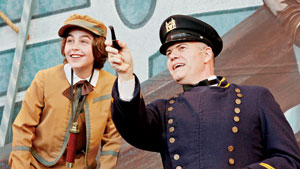 UNDER THE STARS — Starlight Theatre opened its season Monday night with “The King and I,” which continues through Sunday, June 12. The first musical of the season features Leawood resident Grant Karpin as Louis Leonowens. The 13-year-old son of Mimi and Kevin Karpin previously performed at Starlight in 2009 as a local orphan boy in the touring production of “Chitty Chitty Bang Bang.” His theatre experience includes roles in the Kansas City Lyric Opera’s productions of “Charlotte’s Web” and “Three Little Pigs.” He has received extensive training at Miller Marley School of Dance and Voice and regularly performs throughout Kansas City in the school’s productions. He was last pictured in this column in December when he was among a select group of students that performed as dancers and vocalists in 2010’s televised Plaza Lighting Ceremony. He has received additional training at Camp Broadway in New York City. Grant will be in seventh grade this fall at Community School #1 in Mission, Kan.
UNDER THE STARS — Starlight Theatre opened its season Monday night with “The King and I,” which continues through Sunday, June 12. The first musical of the season features Leawood resident Grant Karpin as Louis Leonowens. The 13-year-old son of Mimi and Kevin Karpin previously performed at Starlight in 2009 as a local orphan boy in the touring production of “Chitty Chitty Bang Bang.” His theatre experience includes roles in the Kansas City Lyric Opera’s productions of “Charlotte’s Web” and “Three Little Pigs.” He has received extensive training at Miller Marley School of Dance and Voice and regularly performs throughout Kansas City in the school’s productions. He was last pictured in this column in December when he was among a select group of students that performed as dancers and vocalists in 2010’s televised Plaza Lighting Ceremony. He has received additional training at Camp Broadway in New York City. Grant will be in seventh grade this fall at Community School #1 in Mission, Kan. School’s out and while summer doesn’t officially begin until June 21, the Mitzvah Garden KC crew has already been working for months in hopes of growing a bumper crop of foods that will help the less fortunate in Kansas City.
School’s out and while summer doesn’t officially begin until June 21, the Mitzvah Garden KC crew has already been working for months in hopes of growing a bumper crop of foods that will help the less fortunate in Kansas City. Along those lines, Lehman said one of the garden’s essential components is education. He explained that Jewish holidays related to planting and harvesting are often celebrated at the garden. Study sessions related to planting and the Torah are also held.
Along those lines, Lehman said one of the garden’s essential components is education. He explained that Jewish holidays related to planting and harvesting are often celebrated at the garden. Study sessions related to planting and the Torah are also held.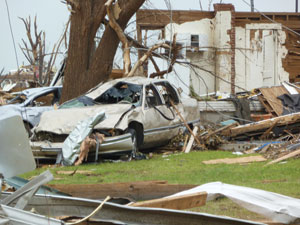 Mara Strom Sachs watched helplessly as footage of the recent tornado damage in Joplin, Mo., rolled across the television. A blogger and author of Kosher on a Budget, Sachs is aware of the power of social networking.
Mara Strom Sachs watched helplessly as footage of the recent tornado damage in Joplin, Mo., rolled across the television. A blogger and author of Kosher on a Budget, Sachs is aware of the power of social networking.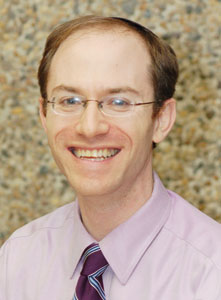 Rabbi Elie Kaunfer is being called an “it” rabbi.
Rabbi Elie Kaunfer is being called an “it” rabbi.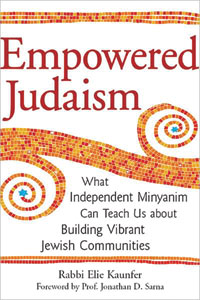 Some may think these minyanim sound a lot like chavurahs, but Rabbi Kaunfer said there are significant differences. One is that the chavurahs of the ‘60s and ‘70s often began as a counter-culture movement and made significant modifications in the words and modes of prayer.
Some may think these minyanim sound a lot like chavurahs, but Rabbi Kaunfer said there are significant differences. One is that the chavurahs of the ‘60s and ‘70s often began as a counter-culture movement and made significant modifications in the words and modes of prayer. Maidhof said the JCC is excited to be offering a larger variety of choices this fall. The class offerings reflect what was learned during surveys taken this past winter, including “the silos that we’ve identified as being spirituality and personal wellness.”
Maidhof said the JCC is excited to be offering a larger variety of choices this fall. The class offerings reflect what was learned during surveys taken this past winter, including “the silos that we’ve identified as being spirituality and personal wellness.”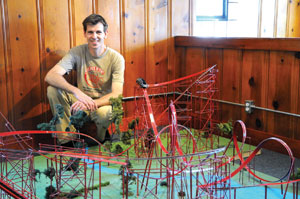 This week marks the second month in a row that Randal Strong-Wallace has an exhibit opening featuring his model roller coasters. “Project 31: The Roller Coasters of Worlds of Fun,” opened Wednesday, June 1, at Union Station. The exhibit is free and will be displayed at Union Station until Aug. 11. It will be open during normal Union Station hours, 9:30 a.m. to 5 p.m. Tuesday through Saturday and 11 a.m. to 5 p.m. Sunday.
This week marks the second month in a row that Randal Strong-Wallace has an exhibit opening featuring his model roller coasters. “Project 31: The Roller Coasters of Worlds of Fun,” opened Wednesday, June 1, at Union Station. The exhibit is free and will be displayed at Union Station until Aug. 11. It will be open during normal Union Station hours, 9:30 a.m. to 5 p.m. Tuesday through Saturday and 11 a.m. to 5 p.m. Sunday.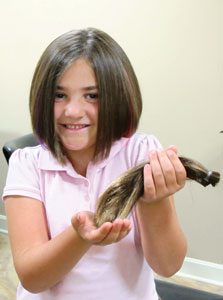 A HAIRCUT TO REMEMBER — Gabrielle Fulford, who will be a second-grade student at the Hyman Brand Hebrew Academy in the fall, recently cut at least eight inches of her hair and donated it to the Pantene Beautiful Lengths program. The hair will be used to create a real-hair wig, which will be distributed for free through American Cancer Society wig banks across the country.
A HAIRCUT TO REMEMBER — Gabrielle Fulford, who will be a second-grade student at the Hyman Brand Hebrew Academy in the fall, recently cut at least eight inches of her hair and donated it to the Pantene Beautiful Lengths program. The hair will be used to create a real-hair wig, which will be distributed for free through American Cancer Society wig banks across the country.